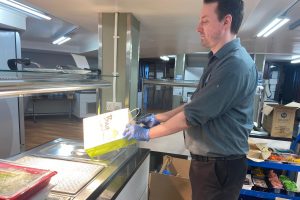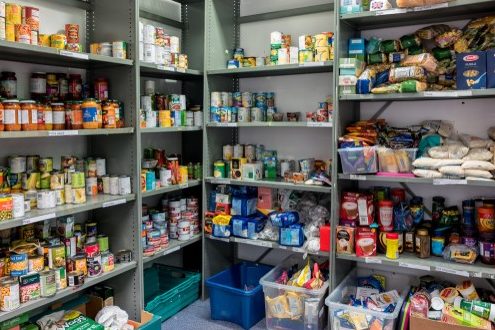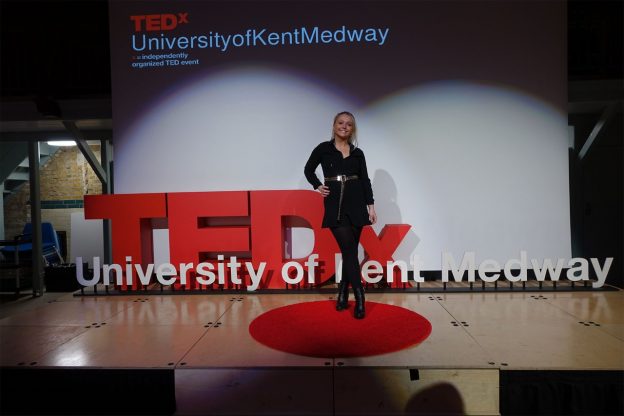What’s your role at the University and how long have you worked here?
I joined the University in 2002 as Bar Supervisor in Mungo’s (Eliot College). I’m currently Food & Beverage Manager for Rutherford Dining Hall, which involves supervising a catering team in one of Kent’s last traditional dining halls – but with a modern twist including a wok bar!
My team of about 30 are multi-talented and can turn their hand to anything from day-to-day cafeteria food to a staff BBQ for hundreds.
How has your role changed as a result of the Covid-19 outbreak?
Rutherford is the only venue on Canterbury campus still offering a catering service – the only other place to buy food is the Co-Op shop. So, we are rotating around 100 staff from different catering venues on shifts – usually around one per week – to help us provide cooked food for around 700 students who are still on campus.

Rosie Ochs, from Mungo’s, preparing food in Rutherford
I’m still trying to lead from the front – I like being hands-on – but also doing a fair chunk of my work from home. I’m one of four food and beverage managers on campus so we take it in turns to lead the team, and work closely with other members of the Kent Hospitality management team.
How easy was it to adapt to the new way of working?
When we first found out about the new social distancing measures – on 20 March – I came back to work that Friday evening and literally helped adapt things overnight. Over the following week, we condensed all our stock – donating food items that were nearer their shelf date to local food banks – and moved everything over to Rutherford.
Rutherford Dining Hall was the obvious choice to stay open – it’s the largest catering space on campus so it’s been easier to put in place a safe-distancing policy. We ask students – usually around 100 per day – to wait in marked out spaces (at most three at one time) and then serve their food in a Bag It box with pre-packed cutlery. Payment is also contactless, so the only thing they have to touch is the takeaway drinks fridge, which we clean on a regular basis.

The new-look Rutherford Dining Hall
What’s worked well?
To my team’s immense credit, most of those who were able to were keen to get back to work and their attitude has been “let’s just do it”. Our team atmosphere is better than it has ever been – in my view, they’re all champions!
What’s proved more tricky?
It’s taken a bit of work to sort out communications across the catering team – especially as colleagues have varying access to technology. To ensure everyone’s connected and up to date with both our team and University news, I use a mixture of What’s App and texts. And I’ve made sure that all members of my team have access to and are using their Kent emails.
What’s the atmosphere like on campus?
It’s pleasant, but very quiet! It’s just us, the Security team and a few contractors. You see some unusual sights – the other day, I saw two students in their dressing gowns working in the computer room, at a safe distance of course!
What’s been the response from your customers?
Most of our students seem to be really happy with what we were doing. For many, it offers a welcome bit of normality in the present time.
Our catering service is usually term-based so we’re keen to let all students still on campus know that we remain open. There’s no commercial aspect to what we’re doing – we’re just keen to keep students fed in a safe environment.
We have had to limit what we do a little – the wok bar has stopped unfortunately – but we’re still able to source fresh local vegetables from a local farm and offer a full menu, including meat, fish and vegetable options, every day from 12-6pm.

Mike Sault, from Sibson Cafe, prepares a Bag-It order
Overall, are you happy with what you’ve achieved so far?
Very much so. I am enormously proud of my team – many of them are volunteering to do extra days! I am also proud that we are still able to provide an essential service – after all, for many of our students this is their home.












